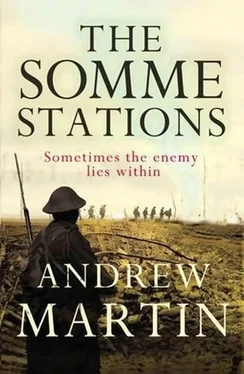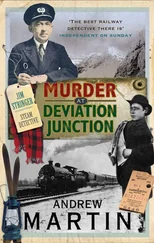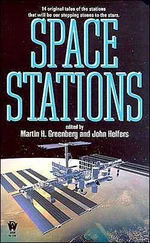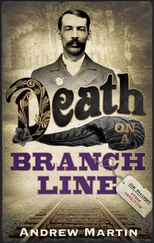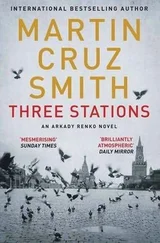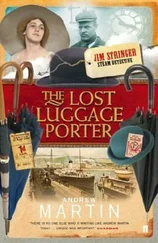Later, back in bed, I made up my mind that I would tell everything, but then Quinn came in holding my own cap, and he was mad for once, and I couldn’t bring myself to explain about it all. I was sure someone would work it all out. Apart from anything else, I suddenly had this very bright cap badge – because you know how Tinsley would go at it with the polish. And I left his glass on the table – well, his two glasses, you’re right about that. I always meant to tell the truth, but in the right way… and in all the questioning, I just couldn’t see my way to doing it. I will tell it to Quinn, I promise you. Meantime, you won’t split on me, will you Jim?’
I shook my head.
‘I won’t split,’ I said.
The blokes in the carriage were beginning to wake, and to stand. We were now coming in to Albert, clashing over a mass of points. The man in the seat directly behind Tinsley stood, and the greatcoat he was putting on looked quite normal, but when I raised my eyes to his head, I saw something amiss. The head was too small; he turned about, and his eyes were wrong as well – it was Roy Butler, the cleverer of the twins. For once, Andy was not at his side, and for that reason I had not heard Roy: he’d had nobody to speak to. It was an extraordinary thing to see him acting independently, but then I recalled that he had once – when Oamer had levelled the rifle at his brother – gone so far as to address me without prompting. Oliver Butler had clearly known of his brother’s presence, but they had travelled separately within the carriage, and my only hope was that this was in order that Roy Butler could sleep. If he hadn’t slept, then it was likely he would have heard Tinsley. This in turn meant that if Tinsley didn’t tell his tale to Thackeray in very short order then someone else would do it for him, and I could see Roy Butler speaking to his brother at that moment, and looking our way as he did so. I did not believe he had slept.
The mercy was that Tinsley, reaching into the luggage rack for his haversack, had no idea of this.
Towards Le Sars: Early October 1916
The target of the Fourth Army was now the German Transloy Line, which ran in a roughly south-easterly direction from Le Sars to Le Transloy. It would be attacked from the captured villages standing directly west of it, including Courcelette and Flers. As already stated, the two-foot track had extended almost to Flers at the close of September.
At the start of October, the platelayers at Burton – the Butler twins among them – extended the line into Flers itself with a succession of girder bridges to cross abandoned British trenches. And a branch was built aiming from there towards Le Sars, the better to pound that end of the Transloy Line. Oliver Butler had been detailed by Oamer to man the control at Flers, which was a dangerous spot, being very forward, and to work on the telephonic communications in that area.
On the day after our trip to Amiens, Tinsley and I coupled the Baldwin up to six flat wagons loaded with shells, all intended for gun positions along the Flers-Le Sars branch. We waited until dusk, then took our rum. (If you did it the other way about, the rum died in you, and you might as well not have had it.)
‘I’ll just give her a breath of steam,’ I said.
The rain had turned to sleet and there was no moon as we rolled through the first woods, past the pool where Tate had died, over the makeshift Ancre Bridge. I knew this evening that they were not just a series of mileposts – they amounted to more than that, and I believed that Tinsley thought so, too. As we ran over the girder bridge – at which point we began to come under shelling – I heard him mutter ‘Little and often’ while he was swinging the shovel. He was not much inclined to speak, and I wondered whether he’d regretted his confession (if that was quite the word) of the night before. At Naburn Lock, the sign announcing the name was still nailed to the post. Oliver Butler would have passed it often, sometimes on foot and alone, but he had never taken down the sign, in spite of his dangerous connection (for I was sure that one existed) with that place, and with Matthew Waddington who had come to grief there.
After an interval of crossing old British trenches by girder bridges, we came to a bombsite, Flers, and I saw a green light wavering into view. A man held it, and he had stepped out of – and also up from – the floor of a broken house. It was Oliver Butler, and his control point was in the basement of that place; telephone cables ran into it. When I rolled the Baldwin up to him, we nodded to each other. He had not, as far as I knew, yet ratted on either Dawson (after Dawson’s own ‘confession’ before dying) or on Tinsley after his loose talk on the train. It struck me that he had now found his place in the world: he had his telephone lines, and a whole Somme village of his own – a little empire of ruins; and he had his lamp, and he was giving us the green, letting us know it was safe to go along the branch to Le Sars. Tinsley was saying as much as he put coal on at my side: ‘We’ve got the green, Jim, let’s go.’
The shelling had lessened somewhat in the previous minutes, even though we were hard up against the front line, and things were quiet at first along the new branch. It ran over a field of hard mud in which a number of enterprises had come to grief. To our left was a small copse, but all the trees were burnt. A house had once been built there, but only one wall remained. On the other side of our line, someone had tried to tow a gun carriage through the field, but it now lay on its side, and two soldiers had walked in the field but they now lay dead, side by side like a married couple in bed, just a few feet from the railway line. It slowly came to me (for the field was dark) that one enterprise was being carried on in that very moment. In the copse to our left, two men were moving about. I could tell by the shape of their tin hats that they were Tommies… and they were breaking the burnt trees, destroying them further, as though not content with the work the shells had done. Puzzling over this, I put a cigarette in my mouth, and I heard the whistle of an approaching shell. As I lit the cigarette I heard – owing to the surprising slowness of the speed of sound – the bang of that same shell being fired. I thought for the moment that everything was slow, but was proved wrong a moment later when there came a great, fast crash and a shout from Tinsley; the line was holed directly in front of us, and I had no sooner made a grab for the brake than we were into the hole, and going over.
… Only now the infectious slowness had returned, and as the Baldwin toppled, we were able to walk out of it, so to speak, stepping off the wheels as it finally crashed into the mud. The wagons were dragged over a second later, the shells toppled off, and our two brakesmen leapt clear. Tinsley and I watched the still-spinning wheels of the Baldwin, illuminated by the flickering Verey lights of the front.
‘I never thought that would happen,’ said Tinsley, after a while.
‘I did,’ I said.
A shell came down in the field somewhere behind us.
‘We can right it with a jack,’ he said.
But we weren’t carrying a jack.
Tinsley was closing his eyes against what was now soft snow.
‘About what you said, last night,’ I said to him, but another shell was racing up and up directly above us, and his face wore a questioning look. There came a great light, but no explosion. I held my breath waiting for the explosion, but instead there was only the light, and the full scale of the disaster stood revealed: our fallen engine, the fallen wagons, the spilled shells; our brakesmen looking on. The shell had evidently got stuck in the sky – it was a light shell rocket, and the white flame swung beneath a small parachute. Beyond it the white clouds raced against the blackness of the heavens, like many pages being rapidly turned. I saw the spirals made by the falling snow, and I saw again my friend Tinsley – the whiteness of his face, a few pimples there, but also the beginnings of a manly handsomeness. I saw the Tommies in the distant trees, and knew what they were about – wood fatigue; the collection of fuel. They were like figures from an older world. I thought of Christmas, and Good King Wenceslas walking with his servant. The hanging light had not stopped the Tommies about their wood-gathering, but I felt wiser than them in that moment, and I knew that it should have stopped them. As they pulled the branches down, the sound of sharp cracks came echoing towards me. I looked to the other side of the line, and saw the two dead soldiers. The light showed me that they were Germans. Stepping over the track, I moved towards where they lay. There was a rifle there, and even though I held my own rifle, I picked it up. I could not say what I was about. I was perhaps tidying up the field, being in a daze, the train having turned over.
Читать дальше
